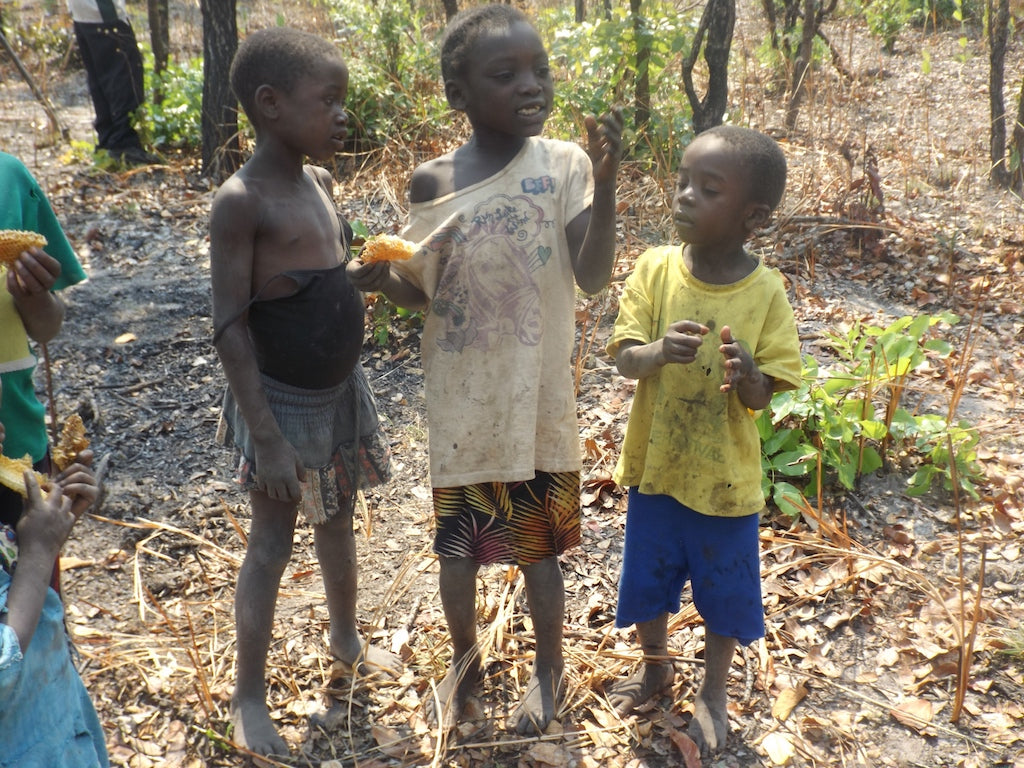
How Our Organic Honey Changes Lives
In celebration of Organic September we spoke with Janet Lowore at Bees for Development to hear how being able to sell their organic forest honey has changed the lives of the beekeepers and their communities in North West Zambia.
Janet has over a decade of experience working in Africa researching forestry and more recently the link between sustainable forest management and forest beekeeping in Africa.
If you haven't tried the incredible honey which we source from Zambia, it is dark and rich and comes from the pristine miombo forests, pictured below, at the source of the Zambezi. Wild honeybees live in bark beehives tucked high into the tree canopy to escape the honey badgers,
pictured below. Twice a year, a proportion of the honeycombs are harvested and brought out of the forest, as it has been for centuries. Janet told us more about the impact that selling honey has on beekeepers lives.

A bark beehive being built, photo courtesy of Janet Lowore

Miombo woodland in North West Zambia,
photo courtesy of Janet Lowore
So who are the beekeepers behind this amazing honey?
The beekeepers are normal everyday small scale subsistence farmers in North West Zambia, the town which the honey is gathered to is called Mwinilunga. It’s a poor part of Zambia, they are pretty much all farmers in that region, growing food to eat and growing a cash crop to get money, but as it's a rural remote area it’s difficult to get to market to sell cash crops.
There is lots of forest in this part of Zambia, the forests are used for lots of different needs of the community - firewood, building materials and traditionally for many generations the communities have practiced forest beekeeping.
They have sold the honey locally or made beer with it. The wider market for the honey has come and gone over the years and not been very consistent, until Dan [who the London Honey Company buy the honey off] started buying honey in the region, which he has done consistently for the past 20 years.

A tree bark hive being tied into a tree with rope made from bark. Photo
courtesy of Janet Lowore.
Dan has provided a consistent market and has invested in the logistics of getting the honey to market. The beekeepers themselves bring it out of the forest to the villages, then each village has a local contact, a liaison beekeeper who collects from about 20 other beekeepers in the village and delivers to Dan. Dan distributes clean food grade buckets to the villages for the honey, this has been a big investment but has been vital in supporting the beekeepers. He’s also offered training on maintaining the quality of the honey - not using too much smoke etc. Dan also pays for the Organic Certification which helps the honey to get a premium value.

Honey being harvested from a bark hive in North West Zambia.
Photo courtesy of Janet Lowore.
How important is the honey as a source of income to the beekeepers?
25-50% of peoples cash income in the area comes from beekeeping. And because the beekeepers use bark beehives which they make themselves it doesn’t cost them anything to get into beekeeping. In comparison growing maize for a cash crop costs them in seed and fertiliser and they might not even get a crop, plus the price of maize is going down. Honey is a higher value crop and provides a more reliable income.
People see other people in their communities beekeeping and making money and they think I could do that, this is development which is scalable and doesn’t rely on investment from charities as the hives are free to build from forest materials.
They invest the money they earn in their local economy, in building a house, starting a shop, trading clothes etc. Dan has been buying for 20 years and so they know they can rely on the trade.
 Why is the honey not Fair-Trade Certified?
Why is the honey not Fair-Trade Certified?
Well, fair-trade certification costs money and you are required to be a producer organisation. These are individual farmers who live spread out over a very large area, how would they gather on a regular basis to have an AGM? There are no buses. We are talking thousands of beekeepers over a wide area. The honey is collected from the villages for them. Fair-trade doesn’t offer them a higher price because Organic Zambian Honey isn’t a low cost commodity, it’s already a high value crop for them. They’ve tried Fair-Trade certification for honey in other African countries and on the whole it hasn’t seemed to make a big difference to the price farmers get. Organic certification seems to help them get a better price more and doesn’t require for them to have producers organisations, which in themselves have costs to administer.

Getting around in the forest, photo courtesy of Janet Lowore.

Why not try the honey for yourself?
Thank you Janet for telling us more about how this incredible honey not only tastes amazing, but is an amazing source of income for the beekeepers and their communities, helping them to make a sustainable living in harmony with the forest.

 Why is the honey not Fair-Trade Certified?
Why is the honey not Fair-Trade Certified?